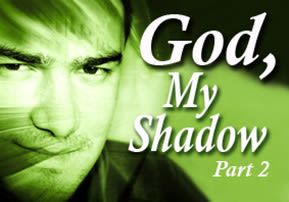
God, My Shadow Part 2
Part of the misconception we seem to have is that this world is about reward and punishment. That is simply not true. The Talmud states specifically in no...

Part of the misconception we seem to have is that this world is about reward and punishment. That is simply not true. The Talmud states specifically in no uncertain terms that reward for good behavior comes in the World-to-Come (Kiddushin 39b). Gihennom, the place one may have to go for not having rectified himself while alive, also comes after history has come to a close.
If this world was about reward and punishment, would bad things happen to good people and good things to bad people? Where would the justice be in that? Though it is true: results can seem like reward for good behavior and problems can have a punishing effect, but they are not reward or punishment. They are, as the Torah points out, effects of causes that we ourselves create.
If you laugh at it, it laughs at you; if you cry to it, it cries to you; if you present an angry or happy countenance, it will present to you likewise. Thus too is God “your shadow” — as you are with Him, that is the way He will respond to you.
This is not talking about reward and punishment. It is talking about cause-and-effect, and thus the Midrash teaches:
One who trusts in God will be surrounded by kindness (Tehillim 32:10): Even an evil person who trusts in God will be surrounded by kindness. (Midrash Tehillim 32:10)
The important thing to remember is that, whatever material success you achieve in this world, you’ll have to account for it on Yom HaDin — the Day of Judgment. To the rasha they will say:
“We gave you the million dollars you wanted passionately and the sports car as well. What did you do with them in the end?”
To the under-confident tzaddik, they may also have an incriminating question:
“You wanted to do so much good in the world, and for that we will reward you. But, we also wanted to give you the million dollars you asked for, but you didn’t believe that it was possible, so it wasn’t. Where was your trust in God? The confidence to succeed you could have learned from that rasha down the street!”
However, the Sitra Achra makes it easy for the rasha, or even just a non-believing person to have confidence in his own success, and easy for the self-effacing tzaddik to believe in his own shortcomings. His job is to challenge a person, and he does it by taking advantage of the weakness of each.
 Photo left: Misplaced beliefs
Photo left: Misplaced beliefsThe weak point of a secular person is that he believes in himself, and not in God. The shortcoming of the tzaddik may be that he believes in God, but not in himself, precisely the problem that the Spies exhibited when they rejected Eretz Yisroel:
They returned from spying the land at the end of forty days. They appeared before Moshe and Aharon, and the entire congregation of the Children of Israel, in the desert of Paran (Kadesh) with word [of their journey]. [They] showed the entire community the fruit of the land, and related the following, “We came to the land to which you sent us, and it certainly flows with milk and honey; this is the fruit from it. However, the people who live there are powerful, and the cities are large and fortified … We are not able to fight the people; they are stronger than us!” (Bamidbar 13:25-28, 31)
They said this with respect to Heaven … (Sotah 35a)
Can this be? Could they have said this? The same people who witnessed God perform the Ten Plagues and destroy the mighty Egyptian army by the sea, not to mention defeating Amalek and providing bread from Heaven? Could they really have thought that the Canaanites were stronger than God?
Rather, it is as the Nefesh HaChaim explains:
In the Holy Zohar it also says in many places that “the sins of men cause imperfections above”; it speaks of the opposite as well. This is the meaning of the verse, “Give strength to God!” (Tehillim 68:35). And in the Zohar, at the beginning of Parashat Bo, it says, “It happened one day that they came … to present themselves before God” (Iyov 1:6): When they want to prosecute the actions of Israel they lay their charges against God, because when Israel acts improperly they weaken the strength of God; when they act correctly they give strength and power to God. With respect to this it is written, “Give strength to God!” Through what? Through proper conduct. (Nefesh HaChaim, Ch. 3)
Thus, the Spies were not saying that the people of Canaan were stronger than God, since they understood full well that God creates, sustains, and maintains everything, including the Canaanites. Any strength that the Canaanim had originated from God.
However, they argued, God has set up the world in such a way that He acts as if His strength depends upon our deeds. The strength He exhibits reflects the strength of belief that we exhibit, and regarding that the posuk testifies:
“All the people that we saw there were of great stature. We saw giants, sons of Anak, who come from giants. If in our eyes we were like grasshoppers, then certainly we were the same in their eyes!” (Bamidbar 13:32-33)
However, not everyone at that time had the same attitude. Kaleiv and Yehoshua took a different approach to the situation, a can-do approach:
Yehoshua the son of Nun, and Kaleiv the son of Yefuneh, two of those who spied the land … spoke to the entire congregation of the Children of Israel and said, “The land which we spied is an excellent land! If God desires it, He can bring us into the land and give it to us …” (Bamidbar 14:6-8)
And, consequently, He did — to them, and the Tribe of Levi, and all the women who did not fall prey to the Spies’ lack of self-confidence. It took forty years to eliminate those who supported the Spies in their claim and belief. However, Yehoshua, Kaleiv, the Tribe of Levi, and all the women entered the land, just as God had promised. They believed in Him, so He believed in them.
Thus, you have the whole secret of exile and redemption, how the Sitra Achra takes advantage of our emotional vulnerabilities and how we overcome him and exile by breaking out of our phase of negativity. We do it by daring to dream, by passionately desiring the objects of our hearts and visualizing a life of success.
You can even feel the emotional shift take place right inside of you when a burst of inspiration convinces us that what we previously thought was beyond us is actually within our reach. And then, once we succeed, we marvel at how God rearranged the universe to make our dream come true, and we wonder why we ever doubted God in the first place.
The Yosefs of history never do. And, if they happen to lose themselves momentarily and falter a bit in their trust in God, they quickly wake up to the backwards thinking while there is still time, and right the wrong, so that Heaven can give to them what it yearns to give: all good.
To be continued
(Author, lecturer, and scholar Rabbi Pinchas Winston is the director of ThirtySix.org. His book Be Positive is available for purchase online)













Tell us what you think!
Thank you for your comment!
It will be published after approval by the Editor.